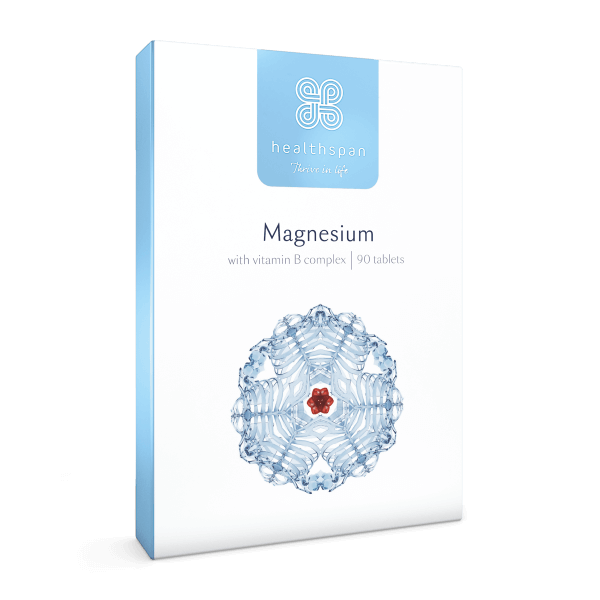Many of us know that our bones need calcium to stay healthy, but did you know that your calcium needs to increase as you go through menopause?
Osteoporosis, which means 'porous bones' is one of the most prevalent diseases in women over 50, and increases your risk of bone fractures. As you reach menopause, the complex changes in your hormone levels affect your calcium needs, and it's important to understand how to protect your bones for the future.
Changing calcium needs during menopause
Many of us tend to think of our bones as a constant hard mass, which are rigid for life. However, our bones are living tissue made up of calcium crystals and other minerals, which give bones strength, that are continually breaking down and being rebuilt. The strength of our bones is defined by bone density, which is the level of minerals in our bones.
As we reach our 20s, our bone density reaches its peak of about 98%. This stabilises throughout our 30s and 40s, at which point bone density starts to decline. What this means is that the rate of bone renewal no longer keeps up with the rate of bone breakdown.
So as we reach menopause, our bone density is already starting to decline, and this then accelerates, mainly caused by the reduction in oestrogen from our ovaries. Oestrogen stimulates calcitonin, a hormone which builds bone, as well as controlling the production of parathyroid hormone, which removes calcium from the bones. Oestrogen also has an effect on our digestive absorption of calcium, and as levels decline, so does our ability to absorb calcium.
Supporting bone density: ensure good levels of dietary calcium
During menopause, a woman's daily calcium intake increases from 1,000 to 1,500mg per day. Dairy is well known to be a good source of calcium, however some studies suggest that too much dairy can be linked to an increased risk of fractures. Include non-dairy sources of calcium as well: green leafy vegetables, seeds (especially sesame seeds), parsley, sardines, oranges, nuts, chickpeas and other pulses. These sources are also richer in magnesium than dairy, which is needed to support the absorption of calcium.
The importance of acid-alkaline balance in osteoporosis prevention
Calcium is also needed to balance our pH, which is how acidic or alkaline we are. If the body detects too much acid, which is usually triggered by acid forming food intake, this prompts a chain of reactions that causes calcium to be taken from our bones, in order to balance the pH. This means that less calcium is in our bones, which can contribute to reduced bone density.
It's important to have a balance of acidic and alkaline forming foods, to prevent calcium being used to balance pH. Your diet should consist of around 80% alkaline forming foods, with 20% acid forming foods. The foods that cause the highest acidic by-products are meat, fish, cheese and grains, with moderate acidity from most nuts (except almonds, coconut and chestnuts), plums, rhubarb, spinach, and corn.
Alkaline forming foods are most fruits and vegetables, millet, buckwheat, coconut and almonds. Foods which taste acidic are not necessarily acid forming, such as vinegar and citrus: these are alkaline forming foods. Make sure your plate is full of fresh vegetables or salad.
Nutrients to support calcium absorption
Just as important as your calcium intake are nutrients which support calcium absorption. The key ones are vitamin D and magnesium.
Vitamin D comes from the action of sun on your skin. Most of us in the UK don't get enough sun exposure and when the sun is shining we are blocking vitamin D production with sun cream. This is where a vitamin D supplement can be very useful, to ensure adequate intake as it's very difficult to get enough from food. Around 1,000 - 2,000 iu of Vitamin D3 (which is 25 - 50 mcg) per day is ideal.
Magnesium comes from foods such as green leafy vegetables, nuts, seeds, fish and wholegrains, and it's the second most common mineral deficiency. You may find that a good quality bone multivitamin and mineral is a good option for you, to ensure you're getting enough calcium and the other nutrients needed for good bone health.
Other ways to support calcium absorption
There are certain foods in your diet which may increase urinary excretion of calcium. These include fizzy drinks, salty foods and caffeine. Tannins, which are high in tea and coffee, also reduce absorption of minerals such as calcium, so keep your intake to a couple of teas or coffee per day.
Supporting stomach acid levels is also a good step, to ensure calcium is properly absorbed. Apple cider vinegar can help with this, as well as having an alkalising effect on the body. Use it in your salad dressings, or in a little warm water before a meal.

Magnesium 375mg
100% recommended daily amount of magnesium per tablet
- Reduces tiredness and fatigue
- Contributes to muscle and psychological function
- Helps maintain bones and teeth







